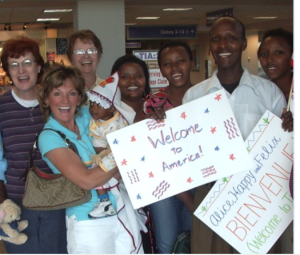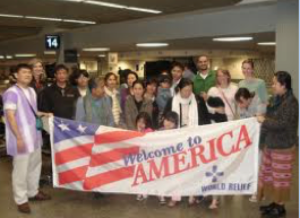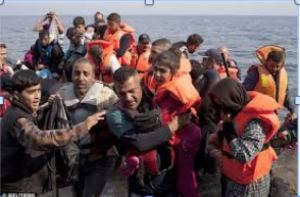 [Cherie Gray is the Executive Director of the Tucson Refugee Ministry in Tucson, Arizona. Her website is Tucson Refugee Ministry. I consider her one of the foremost experts on refugee assimilation in the U.S. I am deeply grateful for Cherie being a guest blogger and providing this three part series]
[Cherie Gray is the Executive Director of the Tucson Refugee Ministry in Tucson, Arizona. Her website is Tucson Refugee Ministry. I consider her one of the foremost experts on refugee assimilation in the U.S. I am deeply grateful for Cherie being a guest blogger and providing this three part series]
This is a new era! It is no coincidence that God is moving millions of people from one continent to another. He is reshuffling the deck –moving people out of their comfort zones – out of the land of their ancestry – out of their spiritual strongholds. There are so many who need to witness the extravagant compassion and mercy of Jesus! He is airlifting them right into your neighborhood.
The good news is that God has already equipped us to bind up the brokenhearted, to comfort those who mourn, to provide for those who grieve, to administer justice, to feed the hungry, to clothe the naked and to welcome the stranger. What a job description! And it belongs to every believer – not just the “professionals”! You’ve got this!!
Below are a few more pointers for reaching out to refugees:
- Identity. The word “Christian” is often misunderstood and defined quite differently by international friends, so you may want to consider other ways to identify yourself with Jesus that carry less negative baggage. If you want your international friends to know that you honor God, even before you open your mouth, consider what you wear (err on the conservative side) and be aware of gender boundaries.
- Humble Yourself. Learning the English language will be the key to success for your refugee friends. You can bring them joy (and entertainment) by making an effort to learn some words in their language. They may laugh at you, but it will build a bridge and they will always appreciate your efforts!
- Healthy Balance. Respect their culture and teach them yours. When you visit them in their house, go by their rules (shoes at the door? sit on floor? eat with fingers?). When you invite them to your home, go by your rules (pray before meal? help yourself?). Our international friends have a beautiful culture and unique traditions. We don’t want them to leave everything behind when they assimilate.
- Report. Ask your pastor if you can give a report to the congregation about your international, cross-cultural adventures with your refugee friends. Prepare a short powerpoint presentation to help others understand your experience. Consider starting a program at your church to give others a chance to embrace a refugee family.
You are called and commissioned to love and serve among the nations! But no need to raise funds for an airline ticket, get your immunizations, write support letters, or even pack your bags. All you need are your car keys! God is bringing the nations to your doorstep. Will you welcome them?
Favorite Resources:
- We Welcome Refugees – positions the global church as a key agent of hope and compassion in the current refugee crisis (wewelcomerefugees.com)
- Refugee Highway Partnership – a worldwide network for Christian believers who are serving refugees; they offer many wonderful resources and an annual refugee ministry summit for the North America region called the RHPNA Roundtable scheduled for July 20-22 in Toronto, Canada. (refugeehighway.net) (www.rhpna.com)
- IAFR – International Association for Refugees is assisting forcibly displaced people together with the refugee church. (iafr.org)
- International Teams – helping churches embrace refugees along the Refugee Highway through ministries of presence, compassion, empowerment and training. (refmin.iteams.org)
- World Relief – empowers the local Church to serve refugees and other vulnerable populations, working in community with the local church to see people transformed economically, socially and spiritually. (wr.org)
- UNHCR – The Office of the United Nations High Commissioner for Refugees was established to lead and co-ordinate international action to protect refugees and resolve refugee problems worldwide. Its primary purpose is to safeguard the rights and well-being of refugees. (www.unhcr.org)



